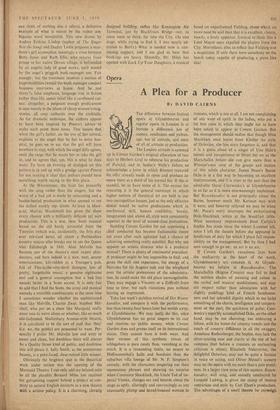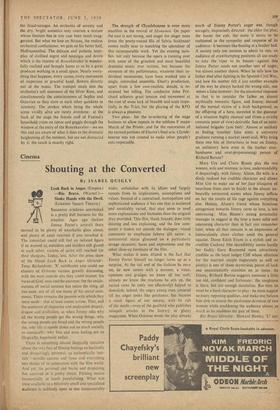Opera
A Plea for a Producer
By DAVID CAIRNS
THE difference between festival opera at Glyndebourne. and regular opera in London is at bottom a difference not of money, conditions and patron- age, but of attitude, and most of all of attitude to production. The London attitude is summed up in Covent Garden's original allocation of two days to Herbert Graf to rehearse his production of Parsilal, and in Sadler's Wells's failure to acknowledge a letter in which Rennert repeated his offer already made to come and produce an • opera there at a third of his normal fee. If this is scandal, let us have more of it. The excuse for repeating it is the 'general contempt in which higher notions of theatrical art are held in our two metropolitan houses, just as the only effective denial would be native productions which in mechanical skill, human credibility, beauty, imagination and, above all, style were consistently superior to the level of second-class pantomime.
Scolding Covent Garden for not appointing a chief conductor has become fashionable (some ten years after such agitation had a chance of achieving something really notable). But why not appoint an artistic director who is a produczr instead? There is plenty of continental precedent. A producer might be less impossible to find; and given the skill and experience, the energy of a Hercules for his Augean task and the whiphand over the artistic pretensions of the administra- tion, he could make the old place unrecognisable. They may engage a Visconti or a Zeffirelli from time to time; but such visitations pass without leaving an impression.
Take last week's styleless revival of Der Rosen- kavalier, and compare it with the performance, less than twenty-four hours later but worlds away, at Glyndebourne., We may justly do this, since Glyndebourne has no great singers in its cast and receives no public money, while Covent Garden does and preens itself on its international status. They cannot have it both ways. And their version of this synthetic cream of schlagobers is pure candy floss, vanishing at the touch. It is a resounding tinkle, no nearer to Hoffmannsthal's halls and boudoirs than the suburban villa lounge of Mr. N. F. Simpson's comedy, with the characters simpering out their momentous phrases and showing no surprise when Constance Shacklock, the Uncle Ted of im- perial Vienna, changes sex and bounds about the stage as aptly, alluringly and convincingly as any reasonably plump and broad-beamed woman in trousers, which is not at all. I am not complaining of any want of spirit in the ladies, who put a lot ihto roles in which they ought not to have been asked to appear at Covent Garden. But the management should realise that though Miss Shacklock once learnt from Kleiber the style of Octavian, she has since forgotten it, and that it is a gross abuse of a singer of Una Hale's talents and inexperience to thrust her on as the Marschallin before she can give more than a Woman's-eye view of the graces and ironies of this subtle character. James Pease's Baron Ochs is in a fair way to becoming an excellent interpretation, and it is truer to the part than the admirable Oscar Czerwenka's at Glyndebourne in so far as it is more overweeningly unpleasant. But Rosenkavalier is not principally about the Baron, however much Mr. Kerman Ray wish it were, and however relieved we may be when Mr. Pease's entry interrupts the embarrassing Hale-Shacklock antics at the breakfast table. What necessary improvement Joan Carlyle's Sophie has made since the winter I- cannot tell, since I left the theatre before she appeared (a dereliction of duty for which I place full respon- sibility on the management). But by then I had seen enough to go on: an act is an act.
If Covent Garden's casualness lays bare the mediocrity at the heart of the work, Glyndebourne's art conceals it. At Glynde- bourne we believe in Rosenkavalier. The Marschallin (116gine Crespin) may fail to find the subtlest shades of meaning and colour in the verbal and musical modulations, and may stir respect rather than admiration with her slightly puddingy kind of French handsome- ness and her splendid dignity which to me lacks something of the charm, intelligence and tempera- ment of the part, the quickness of pulse; Czer- wenka's superbly accomplished Ochs, on the other hand, may be too charming, too endearing a fellow, with his butter-fat country vowels and the touch of country diffidence in all the swagger; Anneliese Rothenberger, the Sophie, may lack the silver-soaring ease and clarity at the top of her compass (but before a creature so enchanting criticism is silent); Elisabeth Soderstram, the delightful Octavian, may not be quite a Jurinac in voice or acting, and Oliver Messel's scenery may set the opera with no more than a pale pretti- ness. In a larger view none of this matters. Rosen- kavalier, well sung, and soundly conducted by Leopold Ludwig, is given the stamp of intense conviction and style by Carl Ebert's production. The advantages of a small theatre far outweigh the disadvantages. An orchestra of seventy and the dry, bright acoustics may coarsen a texture whose fineness has in any case been much exag- gerated. But what we lose on Strauss, the restless orchestral confectioner, we gain on his better half, Hoffmannsthal. The delicate and pathetic inter- play of civilised regret and nostalgia and desire which is the interest of Rosenkavalier is wonder- fully realised and brought home to us by a great producer working in a small space. Nearly every- thing that happens, every caress, every movement of imperious or graceful hand, flowers directly out of the music. The trumpet steals into the orchestra's soft statement of the Silver Rose, and simultaneously the consciousness of Sophie and Octavian as they stare at each other quickens in intensity. The strokes which bring the whole scene vividly alive are rarely overdone : at the back of the stage the female staff of Faninal's household crane on tiptoe and goggle through the window at the entry of the Rosenkavalier—we see this and are aware of what it does to the dramatic heightening of the moment, but are not distracted by it; the touch is exactly right. The strength of Glyndebourne is even more manifest in the revival of Idorneneo. On paper the cast is not strong, and singer for singer none (eVen the pretty-voiced Ilia of Sylvia Stahlman) comes really near to matching the splendour of this incomparable work. Yet the evening satis- fies, not only because the opera is running over with some of the grandest and most beautiful dramatic music ever written, but because the elements of the performance, whatever their in- dividual weaknesses, have been worked into a single, controlled ensemble. Ebert's production, apart from a few over-realistic details, is re- strained but telling. The conductor John Prit- chard achieves great tension and movement at the cost of some lack of breadth and scale (espe- dially in the Trio), but the playing of the RPO is always a pleasure.
Two pleas: for the re-ordering of the stage business to allow repeats in the sublime F major March of the Priests; and for the restoration of the excised portions of Electra's final aria. Glynde- bourne was not created to make other people's cuts respectable.







































 Previous page
Previous page